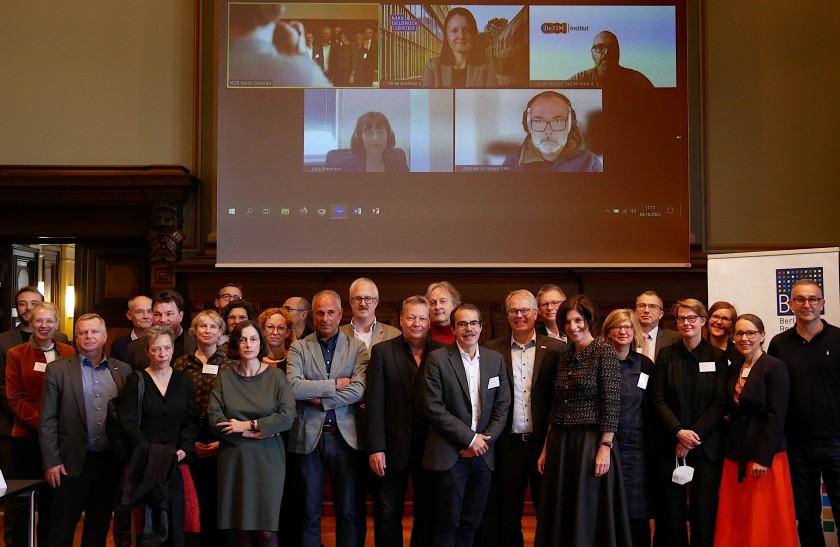For strong non-university research in Berlin

With greater impact: As an association, BR50 can promote networking in the Berlin research area even more strongly.
The non-university research institutions in Berlin will work even more closely together in the future. Their association Berlin Research 50 (BR50), founded in 2020, has joined forces to form a registered non-profit association on 4. October 2022. Together, the research institutions want to further develop and strengthen Berlin as a science location.
Representatives of the institutions gathered at the Social Science Research Center Berlin (WZB) for the official founding of the association. A five-member board was also elected. Following the founding, the association now comprises 27 research and science institutions, including Leibniz and Max Planck Institutes, Helmholtz Centres and federal departmental research institutions. Other non-university institutions in Berlin are associated with the association as partners in the network.
As an association, BR50 will support its member institutions even more in networking with each other and with other scientific actors in Berlin and represent the interests of non-university institutions.
You can find more information on the BR50 page.
BR 50 Podcast - lots of exciting research
Many societal challenges, such as climate change, are far too complex for one scientific discipline to solve alone. But together they are making progress. The BR 50 podcast gives an insight into how versatile the research of "non-university" scientists is. In two podcast episodes, listen to how the Helmholtz Centre Berlin is advancing the energy transformation in society with its research. Here you get to the podcast (in German).
(sz)
https://www.helmholtz-berlin.de/pubbin/news_seite?nid=24132;sprache=en
- Copy link
-
Element cobalt exhibits surprising properties
The element cobalt is considered a typical ferromagnet with no further secrets. However, an international team led by HZB researcher Dr. Jaime Sánchez-Barriga has now uncovered complex topological features in its electronic structure. Spin-resolved measurements of the band structure (spin-ARPES) at BESSY II revealed entangled energy bands that cross each other along extended paths in specific crystallographic directions, even at room temperature. As a result, cobalt can be considered as a highly tunable and unexpectedly rich topological platform, opening new perspectives for exploiting magnetic topological states in future information technologies.
-
MXene for energy storage: More versatile than expected
MXene materials are promising candidates for a new energy storage technology. However, the processes by which the charge storage takes place were not yet fully understood. A team at HZB has examined, for the first time, individual MXene flakes to explore these processes in detail. Using the in situ Scanning transmission X-ray microscope 'MYSTIIC' at BESSY II, the scientists mapped the chemical states of Titanium atoms on the MXene flake surfaces. The results revealed two distinct redox reactions, depending on the electrolyte. This lays the groundwork for understanding charge transfer processes at the nanoscale and provides a basis for future research aimed at optimising pseudocapacitive energy storage devices.
-
Bernd Rech elected to the BR50 Board of Directors
The Scientific Director at Helmholt-Zentrum Berlin is the new face behind the "Natural Sciences" unit at Berlin Research 50 (BR50). Following the election in December 2025, the constituent meeting of the new BR50 Board of Directors took place on 22 January 2026.
Its members are Michael Hintermüller (Weierstrass Institute, WIAS), Noa K. Ha (German Centre for Integration and Migration Research, DeZIM), Volker Haucke (Leibniz Research Institute for Molecular Pharmacology, FMP), Uta Bielfeldt (German Rheumatism Research Centre Berlin, DRFZ) and Bernd Rech (HZB).
